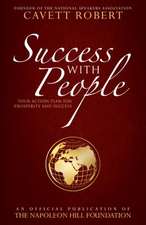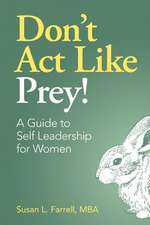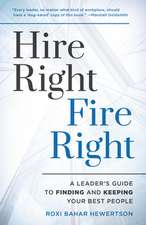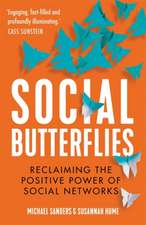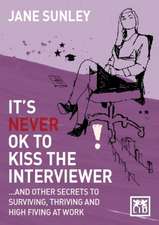The Power of Purpose: Living Well by Doing Good
Autor Peter S. Temesen Limba Engleză Paperback – 28 feb 2007
At the heart of The Power of Purpose are the “three levels of thinking.” At the first level, we ask, Who am I? and What do I want? At the second level, we ask, Who do other people think I am? How do I look to them? But the real magic happens when we hit the third level, forgetting about ourselves and asking the questions that lend a powerful sense of purpose to our lives: How do others look to themselves? How can I help others become the people they want to be?
To help us along the way, Temes, who teaches humanities at Columbia University, draws on the wisdom of great thinkers including Aristotle, Søren Kierkegaard, and Abraham Lincoln; the life lessons of great achievers ranging from Mother Teresa to Michael Jordan; and home truths he’s gathered from his parents, his grandparents, and his three children. From all these sources and from his own life of great personal accomplishment, Temes identifies the essential knowledge that brings people happiness and success. He cites Aristotle’s notion that happiness is not a psychological state but a moral one, resulting from doing good in the world. Temes also believes in the pivotal importance of trust and team-building in every area of life, from the family to the workplace to the street corner.
The Power of Purpose is a map for finding the confidence and power, the opportunities and occasions, and—most important—the techniques and strategies for centering your relationships and work on helping others. It is a book with a point of view: the clearest path to your own success and happiness lies in helping others get to where they want to go.
From the Hardcover edition.
Preț: 109.73 lei
Nou
Puncte Express: 165
Preț estimativ în valută:
21.00€ • 22.82$ • 17.65£
21.00€ • 22.82$ • 17.65£
Carte disponibilă
Livrare economică 01-15 aprilie
Preluare comenzi: 021 569.72.76
Specificații
ISBN-13: 9780307337153
ISBN-10: 0307337154
Pagini: 281
Dimensiuni: 134 x 201 x 20 mm
Greutate: 0.3 kg
Editura: Three Rivers Press (CA)
ISBN-10: 0307337154
Pagini: 281
Dimensiuni: 134 x 201 x 20 mm
Greutate: 0.3 kg
Editura: Three Rivers Press (CA)
Notă biografică
Peter S. Temes’s previous books include Teaching Leadership, Against School Reform (and in Praise of Great Teaching), and The Just War. He teaches in the Core Curriculum at Columbia University and has been a consultant to Goldman Sachs, Ernst & Young, British Telecom, and other multibillion-dollar firms.
From the Hardcover edition.
From the Hardcover edition.
Extras
1
The Three Levels of Thinking
Make the leap from asking, "who am I, and what do I want?" to asking that most powerful question of all--"how do others see themselves, and how can I help them feel stronger and more successful?"
Games are played in all kinds of places--sports stadiums, backyards, offices, classrooms, kitchens, and dining rooms. But games are won in only one place--in the mind of the winning player. That's why Michael Jordan was consistently better than the tallest player in the National Basketball Association every year he played--having better physical tools to work with was not enough to beat a player like Jordan, thinking at a higher level. That's why some salespeople consistently sell more--of the same stuff to the same people--than the rest of their colleagues. That's why David slew Goliath, and that's why your personal path for your success begins right between your ears.
Here's the fact: how we think is the key to how we live. It's the key to your happiness, the key to your personal goodness, and the key to your success.
East Versus West in the Pursuit of Happiness
One useful model of observation on how people think comes in the classic description of the difference between Eastern thinking and Western thinking. Begin with the observation that unhappiness is the product of unmet desires. Eastern thinking says, change your desires to match what you already have, and you will become happy. Western thinking says, change the world to fit your desires, and you will be happy. If you are unhappy because you live in a tiny house and want a bigger home, the traditional Eastern view would be to change your desire so that you want no more than you already have. The Western view would be to go out and build a bigger house, at almost any cost.
There's some wisdom in this model, but the world we live in today is no longer easily divided between East and West; each tradition has drawn on the other for decades now, and the habits and patterns of thinking of each have blended together in important ways. And in my experience, the most successful people have always combined elements of both traditions in their thinking--they embrace the ambition and outward focus of the West as well as the patience and humility of the East.
We all know people who are filled with the Western ambition to go out and change the world. Many succeed, at least now and then, by pushing against the forces of the world and reshaping them. But just about all of them also fail now and then--because they come face-to-face with people, ideas, or parts of the physical world that are simply too strong to be moved. And we all know people who are filled with Eastern patience and humility, ready to reshape their own desires to fill the world. At times, this approach to life is powerfully rewarding, with the ups and downs of the external world softened by a philosophical detachment from external things. But how many opportunities to make positive change in the world slip by, how many chances to have a real impact on the world are missed, because of this detachment?
But imagine the man or woman who looks at the world and understands, this is when I should push, here is the opportunity to reshape the world in some small way, and knows too when to say, here is when I must step back, here is when my desire has to yield to patience. The real power lies in being able to see both visions--both the ambition of the West and the humility and patience of the East--and being able to employ each when it best suits the challenge at hand.
Beyond East and West to the Three Levels of Thinking
For the world we live in today, the best model of human thinking I've come across is built of three levels or stages,1 and it draws from the best of both the East and the West.
At the first level, the most important question for understanding the world and taking action is How do I feel? or How do I look to myself? Picture a teenager waking up in the morning and saying to his parent, I'm not going to school because I don't feel well. Or the worker leaving a note on her desk right after lunch--Gone home, not feeling well. That's level one. How you feel about yourself is almost all you care about.
One level higher, the teen turns to his parent and asks, Do I look as bad as I feel? Or the worker decides not just to leave work, but to go talk with a colleague and say, Wow, I'm not feeling well. In reply, the parent may say, You look fine to me. Or the colleague may say, You should sit down and let me have a look at you. This is the second level, where you progress from asking How do I feel? or How do I look to myself? to How do others feel about me? or How do I look to others? This is a great leap forward--the individual is beginning to realize that other people are important, and that the ways other people see the world are important--but it's not remotely as powerful an outlook as the next level up, the third level.
At the third level, the central question is not about how I feel, or about how others feel about me, but about how they feel about themselves. That might seem like a small step forward, but it can't be overestimated. Think about a sales situation--at the first level, the seller is focused on doing a good job on her own terms; at the second level, she's focused on making a good impression on the sales prospect. But at the third level, the salesperson herself might as well be invisible, because she has no interest in looking good, but only in helping the sales prospect look good in his own eyes, and reach his own goals.
Or think about that teenager who doesn't want to go to school. The teen wakes up and says "I don't feel well" at level one. At level two, he's able to hear a parent say "you don't look sick to me." But at the third level, he's asking about how other people feel and discovers the best possible motive to get out of bed into the world: "other people are depending on me today." The motive to get up and out is not about what matters to me, but what matters to others.
In this is some irony, and some magic. Once you focus on others in this way--as a friend, as a citizen, as a manager, as a colleague--you find that you yourself benefit as much or more than the others you're trying to help. Focusing on the sales prospect's needs instead of your own, you eventually reap the benefits of greater sales--more money, more respect, more confidence. Focusing on getting up out of bed because you understand that you can help others--and what a transforming positive feeling that statement carries with it: I can help others--you find that you become healthier and happier. You help yourself as much as you help others, because your life becomes infused with the purpose of doing good.
My grandfather is a wonderful example of this effect. A self-educated man, he worked most of his life in jobs that did not satisfy his intellect or his desire to help others, but in his free time he was devoted to political causes that he thought could improve the lives of many. He was a socialist and an antiwar activist (though a veteran of World War II himself). Although some might argue that the specifics of his plan for improving the world were misguided, his personal sacrifices to help make positive change filled his life with a sense of purpose. I had the strong feeling that well into his late eighties, he continued to wake up in the morning and get out of bed in order to strike a blow against war, injustice, and poverty every day. That kept him healthy and engaged with the world while many others his age slipped out of touch. But my grandfather had a reason to live and to stay strong: he felt he was needed, and that he could help others.
A woman I know in New Hampshire has a similar story to tell. She calls herself a community activist, having worked for years to get the local government in her town to provide more services for young families and their children. She's spearheaded drives to create a free day-care center, to offer medical services for small children, and to give parents a safe and comfortable public place to bring their children when the long New England winter drags on. Sundays, she sets up out front of the local churches with her folding table, raising money and getting signatures on petitions. Weekdays, she sets up in front of schools and the one big food market in her small town. Everyone knows her, and she's got no shortage of critics as well as staunch friends--in small New England towns, there tend to be plenty of skeptics about providing public services, especially if they require tax dollars to be spent. But this energetic woman, a mother of two young children, says she loves her enemies. "Two things that motivate me," she says, "are helping the little boys and girls who need the basics and don't necessarily get them at home, and proving to those folks who don't think we ought to do more that of course we ought to do more. And I say this: thank goodness for those fools who don't want to help! They keep me fighting. If I didn't have such good and proper enemies, how would I know I was on the right track?"
She gets a good head of steam going as she talks. Clearly, this is a woman who sees her life as filled with important work. She is a hero in her own eyes--she's got to be strong to help the children in her area, and so she is strong. Cause and effect. Because she asks herself the fundamental level-three questions every day--How are others living? What do they think of as their greatest needs?--she's reaching ambitious goals, making an enormous contribution to the lives of others, and filling her life with high purpose.
The Story of Ed and Fred: Tuning in to What Other People Care About Most
We all want to be our own heroes, and hear our own stories. If you grasp this truth, you can use it to reach your own goals.
A famous story about the advertising business offers another glimpse of the way the three levels of thinking work.
Two advertising managers are arguing about the size of the type in an ad they're planning to run in a newspaper. One of them--call him Ed--wants to save money by using smaller size letters in the ad. Smaller letters mean a smaller, less expensive ad overall. The other--call him Fred--says, "You dope, you need big letters to catch people's attention. If we use smaller letters no one will stop and read the ad." Ed says, "Nonsense. If your message is the right message and you say it clearly, everyone will read the ad." Fred's not convinced. Ed proposes a wager: "I'll bet you a thousand dollars I can run an ad in tomorrow's paper that you'll need a magnifying glass to read, and no matter how hard you try, you won't be able to resist reading every last word." Fred smells easy money and takes the bet. The next day, the paper comes out and there on the back page is a block of tiny type. Fred laughs. "OK, pal," he says. "Pay up--I'm not reading it. I couldn't even if I wanted to--the type's too small." "Well, OK, if you really think you won't. But you should know what's in the ad. It's all about you. It's your life story." Try as he might, Fred could not resist, and before the day was over he'd gone out and bought a magnifying glass and read all about himself over and over again.
Fred was stuck at the first level of thinking--he was in love with his own story, as most of us are. Ed understood that and used his insight to win the bet and to save money on advertising by writing ads that used insight into the three levels of thinking to save on space. If you have no insight, your voice has to be loud to be heard--and your ads need to be big. But if you have lots of insight, your voice can be quieter and more civil, and your ads can be smaller and less expensive.
Ed was at the third level--he understood that other people didn't want to hear about the products he had to sell, or about him as a salesperson, but were consumed by their own concerns about themselves and their own personal struggles. He asked the right level-three questions--How do other people look to themselves? What do they care about most? Ed understood that if he could connect the sale of his products to those personal concerns, his ads would be more effective and he'd sell more.
The Story of Marty Edelston: How Second-Level Pride Hobbles the Critics of Successful People
This is the story of a successful businessman with no shortage of critics. But his critics were at level one and level two. Marty was at level three. That's why the critics were working for Marty, instead of the other way around.
I first heard the story of Ed and Fred from Marty Edelston, the founder of a company called Boardroom, Inc. Boardroom publishes the newsletter Bottom Line/Personal, a title that has at times had more than one million paid subscribers. I first went to work for Marty when I was nineteen, and the experience was tremendous. It was a glimpse into big-time publishing and also a fantastic exposure to a successful entrepreneur just hitting his stride as his company was reaching sales of about $35 million a year. Marty is something of a legend in the publishing business, an idiosyncratic man with an iron grip on all the details of his company, requiring personal approval of every word published in his newsletters and books and signing off directly on just about every dollar spent. Throughout the day, secretaries bring Marty healthy snacks of sliced fruit, which he generally eats in the middle of meetings, with his fingers.
One of Marty's great talents is hiring bright and hungry people for key jobs. Many have publishing experience in more traditional firms and some are put off by Marty's highly personal approach and his total control of management at every level in the company.
From the Hardcover edition.
The Three Levels of Thinking
Make the leap from asking, "who am I, and what do I want?" to asking that most powerful question of all--"how do others see themselves, and how can I help them feel stronger and more successful?"
Games are played in all kinds of places--sports stadiums, backyards, offices, classrooms, kitchens, and dining rooms. But games are won in only one place--in the mind of the winning player. That's why Michael Jordan was consistently better than the tallest player in the National Basketball Association every year he played--having better physical tools to work with was not enough to beat a player like Jordan, thinking at a higher level. That's why some salespeople consistently sell more--of the same stuff to the same people--than the rest of their colleagues. That's why David slew Goliath, and that's why your personal path for your success begins right between your ears.
Here's the fact: how we think is the key to how we live. It's the key to your happiness, the key to your personal goodness, and the key to your success.
East Versus West in the Pursuit of Happiness
One useful model of observation on how people think comes in the classic description of the difference between Eastern thinking and Western thinking. Begin with the observation that unhappiness is the product of unmet desires. Eastern thinking says, change your desires to match what you already have, and you will become happy. Western thinking says, change the world to fit your desires, and you will be happy. If you are unhappy because you live in a tiny house and want a bigger home, the traditional Eastern view would be to change your desire so that you want no more than you already have. The Western view would be to go out and build a bigger house, at almost any cost.
There's some wisdom in this model, but the world we live in today is no longer easily divided between East and West; each tradition has drawn on the other for decades now, and the habits and patterns of thinking of each have blended together in important ways. And in my experience, the most successful people have always combined elements of both traditions in their thinking--they embrace the ambition and outward focus of the West as well as the patience and humility of the East.
We all know people who are filled with the Western ambition to go out and change the world. Many succeed, at least now and then, by pushing against the forces of the world and reshaping them. But just about all of them also fail now and then--because they come face-to-face with people, ideas, or parts of the physical world that are simply too strong to be moved. And we all know people who are filled with Eastern patience and humility, ready to reshape their own desires to fill the world. At times, this approach to life is powerfully rewarding, with the ups and downs of the external world softened by a philosophical detachment from external things. But how many opportunities to make positive change in the world slip by, how many chances to have a real impact on the world are missed, because of this detachment?
But imagine the man or woman who looks at the world and understands, this is when I should push, here is the opportunity to reshape the world in some small way, and knows too when to say, here is when I must step back, here is when my desire has to yield to patience. The real power lies in being able to see both visions--both the ambition of the West and the humility and patience of the East--and being able to employ each when it best suits the challenge at hand.
Beyond East and West to the Three Levels of Thinking
For the world we live in today, the best model of human thinking I've come across is built of three levels or stages,1 and it draws from the best of both the East and the West.
At the first level, the most important question for understanding the world and taking action is How do I feel? or How do I look to myself? Picture a teenager waking up in the morning and saying to his parent, I'm not going to school because I don't feel well. Or the worker leaving a note on her desk right after lunch--Gone home, not feeling well. That's level one. How you feel about yourself is almost all you care about.
One level higher, the teen turns to his parent and asks, Do I look as bad as I feel? Or the worker decides not just to leave work, but to go talk with a colleague and say, Wow, I'm not feeling well. In reply, the parent may say, You look fine to me. Or the colleague may say, You should sit down and let me have a look at you. This is the second level, where you progress from asking How do I feel? or How do I look to myself? to How do others feel about me? or How do I look to others? This is a great leap forward--the individual is beginning to realize that other people are important, and that the ways other people see the world are important--but it's not remotely as powerful an outlook as the next level up, the third level.
At the third level, the central question is not about how I feel, or about how others feel about me, but about how they feel about themselves. That might seem like a small step forward, but it can't be overestimated. Think about a sales situation--at the first level, the seller is focused on doing a good job on her own terms; at the second level, she's focused on making a good impression on the sales prospect. But at the third level, the salesperson herself might as well be invisible, because she has no interest in looking good, but only in helping the sales prospect look good in his own eyes, and reach his own goals.
Or think about that teenager who doesn't want to go to school. The teen wakes up and says "I don't feel well" at level one. At level two, he's able to hear a parent say "you don't look sick to me." But at the third level, he's asking about how other people feel and discovers the best possible motive to get out of bed into the world: "other people are depending on me today." The motive to get up and out is not about what matters to me, but what matters to others.
In this is some irony, and some magic. Once you focus on others in this way--as a friend, as a citizen, as a manager, as a colleague--you find that you yourself benefit as much or more than the others you're trying to help. Focusing on the sales prospect's needs instead of your own, you eventually reap the benefits of greater sales--more money, more respect, more confidence. Focusing on getting up out of bed because you understand that you can help others--and what a transforming positive feeling that statement carries with it: I can help others--you find that you become healthier and happier. You help yourself as much as you help others, because your life becomes infused with the purpose of doing good.
My grandfather is a wonderful example of this effect. A self-educated man, he worked most of his life in jobs that did not satisfy his intellect or his desire to help others, but in his free time he was devoted to political causes that he thought could improve the lives of many. He was a socialist and an antiwar activist (though a veteran of World War II himself). Although some might argue that the specifics of his plan for improving the world were misguided, his personal sacrifices to help make positive change filled his life with a sense of purpose. I had the strong feeling that well into his late eighties, he continued to wake up in the morning and get out of bed in order to strike a blow against war, injustice, and poverty every day. That kept him healthy and engaged with the world while many others his age slipped out of touch. But my grandfather had a reason to live and to stay strong: he felt he was needed, and that he could help others.
A woman I know in New Hampshire has a similar story to tell. She calls herself a community activist, having worked for years to get the local government in her town to provide more services for young families and their children. She's spearheaded drives to create a free day-care center, to offer medical services for small children, and to give parents a safe and comfortable public place to bring their children when the long New England winter drags on. Sundays, she sets up out front of the local churches with her folding table, raising money and getting signatures on petitions. Weekdays, she sets up in front of schools and the one big food market in her small town. Everyone knows her, and she's got no shortage of critics as well as staunch friends--in small New England towns, there tend to be plenty of skeptics about providing public services, especially if they require tax dollars to be spent. But this energetic woman, a mother of two young children, says she loves her enemies. "Two things that motivate me," she says, "are helping the little boys and girls who need the basics and don't necessarily get them at home, and proving to those folks who don't think we ought to do more that of course we ought to do more. And I say this: thank goodness for those fools who don't want to help! They keep me fighting. If I didn't have such good and proper enemies, how would I know I was on the right track?"
She gets a good head of steam going as she talks. Clearly, this is a woman who sees her life as filled with important work. She is a hero in her own eyes--she's got to be strong to help the children in her area, and so she is strong. Cause and effect. Because she asks herself the fundamental level-three questions every day--How are others living? What do they think of as their greatest needs?--she's reaching ambitious goals, making an enormous contribution to the lives of others, and filling her life with high purpose.
The Story of Ed and Fred: Tuning in to What Other People Care About Most
We all want to be our own heroes, and hear our own stories. If you grasp this truth, you can use it to reach your own goals.
A famous story about the advertising business offers another glimpse of the way the three levels of thinking work.
Two advertising managers are arguing about the size of the type in an ad they're planning to run in a newspaper. One of them--call him Ed--wants to save money by using smaller size letters in the ad. Smaller letters mean a smaller, less expensive ad overall. The other--call him Fred--says, "You dope, you need big letters to catch people's attention. If we use smaller letters no one will stop and read the ad." Ed says, "Nonsense. If your message is the right message and you say it clearly, everyone will read the ad." Fred's not convinced. Ed proposes a wager: "I'll bet you a thousand dollars I can run an ad in tomorrow's paper that you'll need a magnifying glass to read, and no matter how hard you try, you won't be able to resist reading every last word." Fred smells easy money and takes the bet. The next day, the paper comes out and there on the back page is a block of tiny type. Fred laughs. "OK, pal," he says. "Pay up--I'm not reading it. I couldn't even if I wanted to--the type's too small." "Well, OK, if you really think you won't. But you should know what's in the ad. It's all about you. It's your life story." Try as he might, Fred could not resist, and before the day was over he'd gone out and bought a magnifying glass and read all about himself over and over again.
Fred was stuck at the first level of thinking--he was in love with his own story, as most of us are. Ed understood that and used his insight to win the bet and to save money on advertising by writing ads that used insight into the three levels of thinking to save on space. If you have no insight, your voice has to be loud to be heard--and your ads need to be big. But if you have lots of insight, your voice can be quieter and more civil, and your ads can be smaller and less expensive.
Ed was at the third level--he understood that other people didn't want to hear about the products he had to sell, or about him as a salesperson, but were consumed by their own concerns about themselves and their own personal struggles. He asked the right level-three questions--How do other people look to themselves? What do they care about most? Ed understood that if he could connect the sale of his products to those personal concerns, his ads would be more effective and he'd sell more.
The Story of Marty Edelston: How Second-Level Pride Hobbles the Critics of Successful People
This is the story of a successful businessman with no shortage of critics. But his critics were at level one and level two. Marty was at level three. That's why the critics were working for Marty, instead of the other way around.
I first heard the story of Ed and Fred from Marty Edelston, the founder of a company called Boardroom, Inc. Boardroom publishes the newsletter Bottom Line/Personal, a title that has at times had more than one million paid subscribers. I first went to work for Marty when I was nineteen, and the experience was tremendous. It was a glimpse into big-time publishing and also a fantastic exposure to a successful entrepreneur just hitting his stride as his company was reaching sales of about $35 million a year. Marty is something of a legend in the publishing business, an idiosyncratic man with an iron grip on all the details of his company, requiring personal approval of every word published in his newsletters and books and signing off directly on just about every dollar spent. Throughout the day, secretaries bring Marty healthy snacks of sliced fruit, which he generally eats in the middle of meetings, with his fingers.
One of Marty's great talents is hiring bright and hungry people for key jobs. Many have publishing experience in more traditional firms and some are put off by Marty's highly personal approach and his total control of management at every level in the company.
From the Hardcover edition.
Descriere
With examples from Mother Teresa to Michael Jordan, this inspiring guide reveals the fast track to a happy life and meaningful success: learning to think of others before ourselves.



